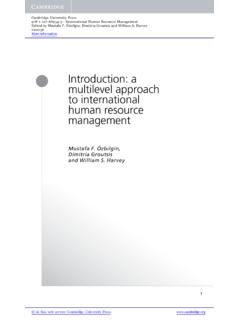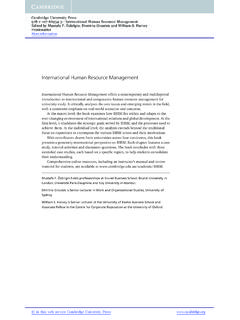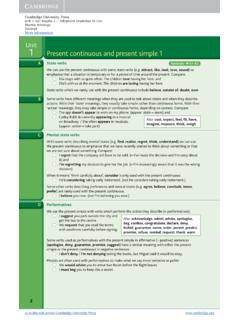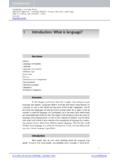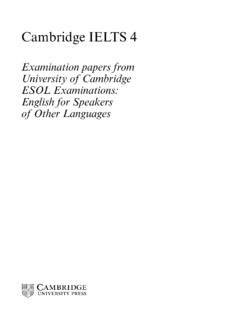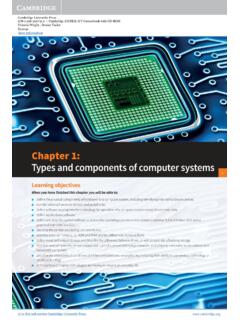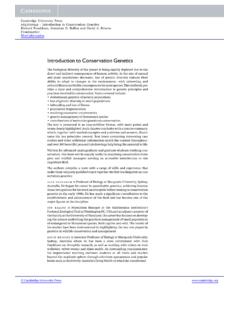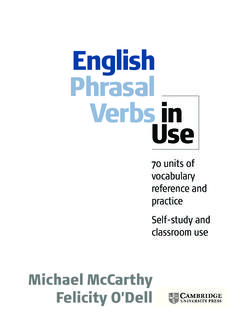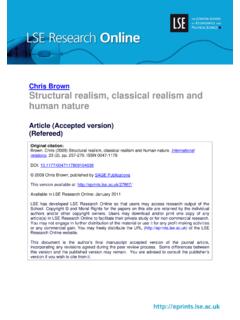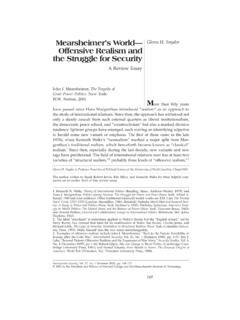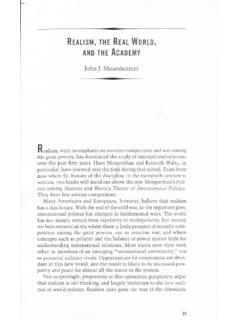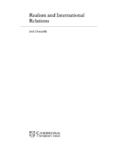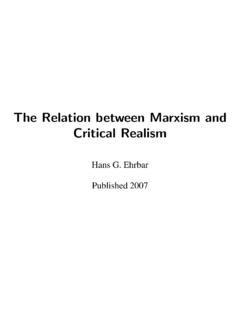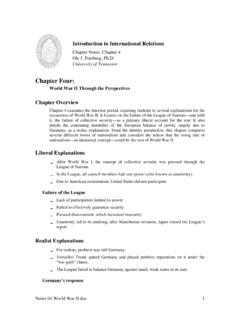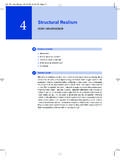Transcription of Realism and International Relations - Assets
1 Realism and International Relationsprovides a critical yet sympatheticsurvey of political Realism in International theory. Using six paradig-matic theories Hans Morgenthau, Kenneth Waltz, the Prisoners Dilemma, Thucydides, Machiavelli, and Hobbes the book examinesrealist accounts of human nature and state motivation, internationalanarchy, system structure and the balance of power, International insti-tutions, and morality in foreign policy. Donnelly argues that commonrealist propositions not only fail to stand up to scrutiny but are rejectedby many leading realists as well. Rather than a general theory of interna-tional Relations , Realism is best seen as a philosophical orientation orresearch program that emphasizes in an insightful yet one-sided way the constraints imposed by individual and national egoism and interna-tional anarchy.
2 Containing chapter-by-chapter guides to further readingand discussion questions for students, this book offers an accessible andlively survey of the dominant theory in International donnellyis Andrew W. Mellon Professor in the GraduateSchool of International Studies at the University of Denver. He is theauthor ofThe Concept of Human Rights,Universal Human Rights inTheory and Practice, andInternational Human Rights. Cambridge University University Press978-0-521-59229-1 - Realism and International RelationsJack DonnellyFrontmatterMore informationthemes in International relationsThis new series of textbooks aims to provide students withauthoritative surveys of central topics in the study of InternationalRelations. Intended for upper level undergraduates and graduates,the books will be concise, accessible and comprehensive.
3 Eachvolume will examine the main theoretical and empirical aspects ofthe subject concerned, and its relation to wider debates inInternational Relations , and will also include chapter-by-chapterguides to further reading and discussion questions. Cambridge University University Press978-0-521-59229-1 - Realism and International RelationsJack DonnellyFrontmatterMore informationRealism and InternationalRelationsJack Donnelly Cambridge University University Press978-0-521-59229-1 - Realism and International RelationsJack DonnellyFrontmatterMore informationCAMBRIDGE UNIVERSITY PRESSC ambridge, New York, Melbourne, Madrid, Cape Town, Singapore, S o PauloCambridge University PressThe Edinburgh Building, Cambridge CB2 2RU, UKPublished in the United States of America by Cambridge University Press, New on this title: Jack Donnelly 2000 This publication is in copyright.
4 Subject to statutory exceptionand to the provisions of relevant collective licensing agreements,no reproduction of any part may take place withoutthe written permission of Cambridge University published 2000 Reprinted 2002A catalogue record for this publication is available from the British LibraryLibrary of Congress Cataloguing in Publication dataDonnelly, and International Relations / Jack bibliographical references and 0 521 59229 1 (hb) ISBN 0 521 59752 8 (pb)1. International Relations . 2. Realism . I. 01 dc2199-053676 ISBN-13 978-0-521-59229-1 hardbackISBN-10 0-521-59229-1 hardbackISBN-13 978-0-521-59752-4 paperbackISBN-10 0-521-59752-8 paperbackTransferred to digital printing 2006 Cambridge University University Press978-0-521-59229-1 - Realism and International RelationsJack DonnellyFrontmatterMore informationContentsAcknowledgmentspagevi iIntroduction11 The realist tradition62 Human nature and state motivation433 Anarchy, hierarchy, and order814 System, structure, and balance of power1075 Institutions and International society1316 Morality and foreign policy161 Conclusion.
5 The nature and contribution of realism193 Selected recommended readings203 References205 Index228v Cambridge University University Press978-0-521-59229-1 - Realism and International RelationsJack DonnellyFrontmatterMore informationAcknowledgmentsI began working on this book a decade ago, in the spring of 1989, at theNetherlands Institute of Advanced Study. My long list of debts thus mustbegin with Peter Baehr, who invited me to participate in his researchgroup, and Dirk van de Kaa, who as Director made the NIAS an incredi-bly supportive place for scholarly research. Had I been able to remainlonger within the comfortable confines of Wassenaar I am sure that thegap between the start andfinish of this project would have been the years, various incarnations of this work have been commentedon, orally or inwriting, by numerous friendsand colleagues.
6 MichaelDoyle, Peter Euben, Daniel Garst, Alan Gilbert, Arthur Gilbert, PeterHaas, Barry Hughes, Micheline Ishay, Bob Jackson, Bob Keohane,Harold Koh, Steve Krasner, Steve Leonard, Andrew Linklater, DavidLumsdaine, Terry Nardin, Clifford Orwin, Joel Rosenthal, Eduardo Saxe,Michael Smith, Terry Sullivan, Alex Wendt, and Jim White are the namesthat appear in my records. I thank you all. To those whom I have forgottento record, my gratitude is compounded by guilt over my also thank Bassem Hassan and Jacek Lubecki for theirfine work asresearch assistants. Bassem also did much of the work of checking cita-tions. And I owe special debts to four additional Howard s careful and skeptical eye, as usual, forced me togreater precision. Beyond the particular contributions of her line-by-linecriticisms, her position as a reader outside the debates of internationalrelations theory constantly reminded me to write for the broader audi-ence this book is intended to Donnelly read the entire manuscript with unusual care.
7 Moreoften than I might care to admit, she drew attention to bad writing habitsand stylistic infelicities, as well as the occasional passage that could onlybe described as hopelessly obscure. She also regularly and forcefullyreminded me that there is more to life than McKeown believed in this project early on and provided muchappreciated encouragement as a series of early versions of what havevii Cambridge University University Press978-0-521-59229-1 - Realism and International RelationsJack DonnellyFrontmatterMore informationbecome chapters 2 and 6 were rejected by all the best journals in immediately, his detailed comments on the next to last draft ofchapter 2 helped me to nail down arguments that were not yet sufficientlyclear and to avoid some significantly exaggerated claims of my Snyder s thoughtful observations on the epistemological impli-cations of my line of argument, as well as numerous helpful suggestionsfor clarifying particular points, greatly improved thefinal draft.
8 I espe-cially appreciate his help because I know that he disagrees with the sub-stance of a number of my principal , I must thank more than a decade s worth of graduate studentsin Chapel Hill and Denver. If I have succeeded in communicating clearly,it is in significant measure a result of their questions and puzzlement. Byrefusing to accept easy answers about either the strengths or weaknessesof Realism , they have forced me to confront this material with a depth andprecision that would have been impossible to Cambridge University University Press978-0-521-59229-1 - Realism and International RelationsJack DonnellyFrontmatterMore informatio
